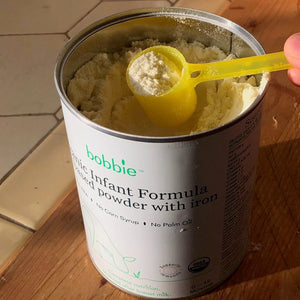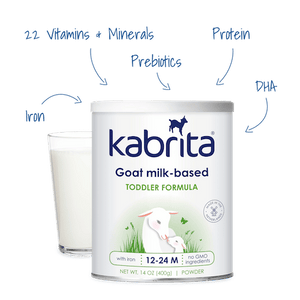Below is an email I recently sent to a private client of mine. Since the number one question I receive is “What is the safest infant formula?,” I thought some of you might be interested in my analysis of the two safest brands of baby formula, HiPP vs. Holle (both from Europe). Note that whichever formula you choose, you should always use a water filter to remove chlorine (carcinogenic) and fluoride (linked with lowered IQ). (Here’s more on why you should get a filter and which ones I like.)
Dear E.:
So the bottom line is I would recommend Holle formula as the best option, but it’s not without some problems, unfortunately (yet again it becomes clear that nothing can compare with breastmilk). HiPP is superior in a few ways, but I’ll explain why ultimately I would go with Holle below.


Here’s what I considered when researching HiPP vs. Holle:
- Palm oil. Palm oil is an ingredient that a lot of people worry about (suspected to affect bone density), and both HiPP and Holle contain it. However, because they each contain a blend of other oils (like coconut and sunflower), I don’t think the amount is as concerning. They do both also contain rapeseed oil, otherwise known as canola oil, which is also somewhat controversial. It’s worth noting that Baby’s Only doesn’t contain palm oil–but it does contain soybean oil, which I don’t like, so not really a huge win.
- Aluminum issue. The HiPP ready-made formula is preferable to the HiPP powder because the latter has strangely high aluminum levels, although even the ready-man has borderline levels. (I can’t figure out why–possibly because it comes in aluminum pouches (within a cardboard box)). However, in general I actually DON’T like ready-made formulas because they contain soy lecithin (sometimes extracted with hexane…and soy is problematic anyway because of its estrogenic properties). On the other hand, the amount of lecithin is relatively small, and probably worth the trade-off. Note that the HiPP Growing Up milk in powder form actually has much lower levels of aluminum (but you can’t use that until after 12 months, and it does contain soy lecithin. Sigh). Bottom line here is go for ready-made or Growing Up milk if you do get HiPP, but with Holle you don’t have to worry about this.
- LCP oils. The addition of omega 3 and 6 oils in U.S. formulas is controversial because of the extraction methods (super complicated issue so I’ll spare you all the details). HiPP has these added oils, but I suspect the extraction methods are probably required to be cleaner in Europe. Unfortunately, I’ve been unable to get to the bottom of this, so it’s a question mark and potentially another negative for HiPP. And studies show that the addition of the oils doesn’t improve the nutrition for babies anyway, so their absence isn’t really a negative for Holle.
- Organic practices. Both of these companies have been around for more than 50 years, and the dairy products from both come from grass-fed, organic cattle, certainly of a higher quality that anything you get here. Holle farms are certified organic and biodynamic–which I’ll simplify by saying is like organic-plus, with very strict standards from the processing all the way to the packaging. Another point in the Holle column.
- Sugars. All formula has a lot of sugar (breastmilk is naturally quite sweet), and HiPP wins in this category, as it uses lactose as a sweetener, which is the best option (and also the most expensive). Holle uses maltodextrin (a plant-based sweetener), although it seems to use less of it than most American formula brands. And here’s an update from July 2015: Lebenswert is a newish formula under the Holle umbrella. The Stage 1 Lebenswert formula contains lactose instead of maltodextrin, and Lebenswert is now available at here!
- Prebiotics. This is another win for HiPP. Holle doesn’t contain these, and it’s one of the big things found in breastmilk but missing from formula.
Bottom line: Both HiPP and Holle are superior to American formulas, in my opinion. They lack many of the concerning ingredients found in most formula you get here, don’t have white sugar or corn syrup in them, and also skip some preservatives and the carrageenan found even in other organic formulas. If it were my baby, I would probably choose Holle because of the aluminum issues with HiPP–which to me is more concerning than the maltodextrin (the only major downside to Holle). The lecithin, biodynamic farming, and LCP oil issues further put Holle in the lead. And if you choose Stage 1 Lebenswert, you skip the maltodextrin as well.
Stay sane,






200 comments
Esther
Hello, have you been happy with the products you received from this website?? I just went to the site and you are right, the prices are definitely the cheapest I’ve seen.
Maia James
Hi Susie-
If it were my baby, I would probably stick with Lebenswert stage 1, but this is a question you should take up with your pediatrician! One thing about Holle that’s better than Lebensert is that the milk comes from cows on a biodynamic farm (as opposed to simply organic). Ultimately, this is a personal decision, but as I said, I would recommend asking a pediatrician you trust to take a look at the ingredients and nutrition on whichever formulas you are considering.
Susie
Hi,
What are the differences between Holle 2 and Lebenswert 2? Which one would you recommend be for a baby over 6 months who needs a little bit of supplementation in addition to exclusive breastmilk (maybe just a bottle a day)? Also, I know you mentioned you’d prefer Levenswert 1 because it does not contain maltodextrin. What are the differences between Lebenswert 1 and 2 besides maltodextrin and iron levels? Thanks!!Dee
Oh no! Makes me nervous because I have a large supply from them right now (I buy in bulk). :( Do you think it’s safe to continue using the formula? My baby seems to being doing fine on it so I’m assuming it’s at least safe, but do you think there could be something wrong with BOB’s supply (such as being counterfeit or something)? Thanks again!!
Kassidy
My son has been on holle lebenswert for over a month now and is still really gassy, is there one you would recommend to help with that? I use Dr. Browns bottles and am burping in the middle of feeds… But still and I don’t want to have to give my kid gripe water every single day a couple times :(
maia
Hi Beth-
My understanding that Europe’s version of “organic” is actually much more meaningful than ours is. Still, I agree that milk from cows living on a biodynamic farm is even better! It’s a weighing of the pluses and minuses, and ultimately a personal decision. I guess for me, I would favor the lack of maltodextrin over the lack of biodynamic milk, but an argument could definitely be made for the opposite!
Beth
I have a question – with my first, after I stopped EBF at 7 months, I supplemented with Holle formula until 17 months. While I think the lactose/maltodextrin switch is a great thing, my concern is the milk itself. The Lebenswert formula states the milk is from organic farming, but the Holle formula states biodynamic farming. I love the thought of the biodynamic farming since “organic” can be misused Do you have any clarification on the issue? Thanks!
maia
Hi Dee-
I had some additional questions about BOB’s supply chain and was unable to get a clear answer from them. I think it’s probably still fine, but I don’t want to recommend anyone that I am not 100% confident about.
Dee
Hi Maia,
I’ve been ordering quite a bit from Beyond Organic Baby but I don’t see them listed on your site anymore as a good place to buy from. Am I just not seeing it, or have you removed them for some reason? I’m nervous that maybe there is a problem with them that I’m not aware of. Thanks in advance!!!Maia James
The downside to the stage 2 is that it contains maltodextrin. I know a lot of parents who choose to continue feeding their baby stage 1 after 6 months—just check with your pediatrician!